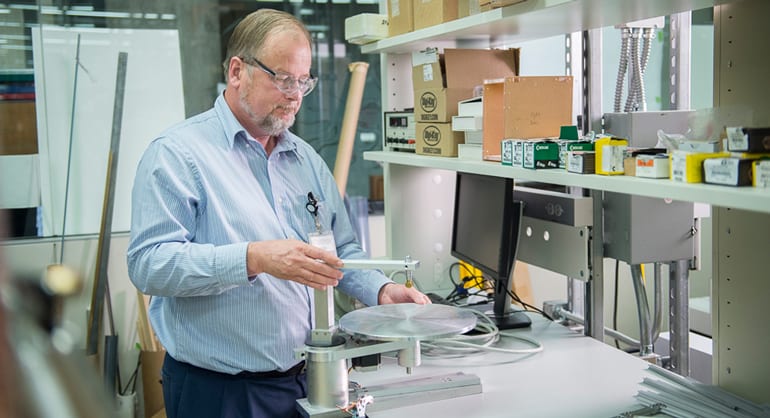Thomas “Rock” Mackie is no stranger to the practice of innovation and entrepreneurship. From the research and development stage to commercialization and investments, Mackie has seen ideas become tangible, marketable products on more than one occasion.
“When WARF talks about the cycle of innovation, Rock just represents all of it,” says Carrie Thome, director of investments at the Wisconsin Alumni Research Foundation (WARF).
Though he’s retiring at the end of 2014, Mackie plans to continue imparting lessons learned by helping the University of Wisconsin–Madison grow its entrepreneurial strengths.
As a professor at UW–Madison, Mackie worked with 38 Ph.D. students, four master’s students and helped to build a tradition of spinoffs from the departments of biomedical engineering and medical physics.
“Contributing to the benefit of larger society is something our university should aspire to,” Mackie says. “I think the university needs to complete the transition to becoming an entrepreneurial university. Some simple changes could make the campus climate more welcoming to academic entrepreneurs.”
For example, Mackie says, managing conflicts of interest is important. But rather than assume entrepreneurial efforts conflict with the academic, look for the “coincidence of interest” instead. These are cases where the university can make money off licensing a product or will potentially benefit from the success of an entrepreneurial endeavor.
“We need to find ways for the university to start understanding that the coincidences are going to help fund the university and drive economic development,” Mackie says. “We’re all here in academia with our hands out to the federal government, and I’m not sure that money will continue to flow.”
In an effort to cultivate the environment of entrepreneurship at UW–Madison, Mackie is leading the Advocacy Consortium for Entrepreneurs (ACE). Launched in 2013, ACE supports faculty, staff, alumni and students across campus hoping to commercialize their research and creativity. The consortium already taps into a multitude of departments across campus and hopes to spark and encourage forays into entrepreneurship.
Mackie will also continue to work with the Morgridge Institute for Research, transitioning from his role as the director of medical engineering to more development and policy-focused work—still tapping into his strategic talents.
“Rock is somebody who’s got all these great ideas, who’s fun to be with and who helps realize dreams of doing things that nobody has done before, says Brad Schwartz, CEO of the Morgridge Institute.
“I’m thrilled he’s continuing to work for Morgridge to help us with our development efforts and, most importantly, working with our investigators to see if their ideas can be made into something useful for society.”
